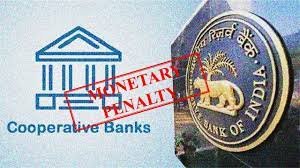RBI Imposed Monetary Penalties on Yet Another Three Co-operative Banks
The Reserve Bank of India (RBI) continues its efforts to maintain the stability and integrity of the Indian banking sector. In its latest move, the RBI imposed monetary penalties on three co-operative banks for various regulatory violations. This development has significant implications for candidates preparing for government exams, particularly those targeting banking and civil service positions. Let’s delve into the details of this important news.

Why this News is Important:
1. Regulatory Vigilance Ensures Banking Sector Stability: The RBI’s imposition of monetary penalties highlights its commitment to maintaining a robust and stable banking sector. This move is part of its ongoing efforts to curb malpractices and ensure that financial institutions adhere to regulations. Aspiring bankers and civil servants need to understand the significance of regulatory vigilance in upholding financial stability.
2. Impact on Co-operative Banks: This news is especially relevant for candidates preparing for banking exams. It underscores the importance of compliance and adherence to RBI guidelines for co-operative banks. Understanding the consequences of regulatory violations is crucial for those aspiring to work in the banking sector.
Historical Context:
To provide a historical context, it’s essential to note that the RBI has been actively monitoring and regulating the banking sector for decades. Co-operative banks play a vital role in India’s financial landscape, serving millions of customers. However, instances of non-compliance with regulations have occurred in the past, leading to the RBI taking corrective actions such as imposing penalties. This ongoing regulatory oversight aims to prevent financial instability and protect depositors’ interests.
Key Takeaways from RBI’s Monetary Penalties on Co-operative Banks:
| Serial Number | Key Takeaway |
|---|---|
| 1. | RBI’s commitment to maintaining banking sector stability. |
| 2. | Consequences of regulatory violations on co-operative banks. |
| 3. | The role of compliance in the banking sector. |
| 4. | The historical context of RBI’s regulatory actions. |
| 5. | The significance of protecting depositors’ interests. |
Important FAQs for Students from this News
Q1: What is the Reserve Bank of India (RBI), and what is its role in the Indian banking sector?
A1: The RBI is India’s central banking institution responsible for regulating and supervising the country’s banking and financial system. Its role includes maintaining monetary stability, managing currency, and ensuring the soundness of financial institutions.
Q2: Why did the RBI impose monetary penalties on co-operative banks?
A2: The RBI imposed penalties on co-operative banks for various regulatory violations, such as non-compliance with guidelines and regulations. These penalties are imposed to maintain the integrity and stability of the banking sector.
Q3: How does this news affect candidates preparing for government exams?
A3: This news is relevant for candidates preparing for exams related to banking and civil services as it highlights the importance of regulatory compliance and the consequences of violations in the banking sector.
Q4: Can you provide examples of regulatory violations that led to these penalties?
A4: Regulatory violations can include issues related to governance, risk management, asset quality, and non-compliance with RBI guidelines. Specific instances may vary.
Q5: What are the key takeaways for candidates from this news?
A5: The key takeaways include understanding the significance of regulatory compliance, the role of the RBI in maintaining banking sector stability, and the historical context of regulatory actions.
Some Important Current Affairs Links
















